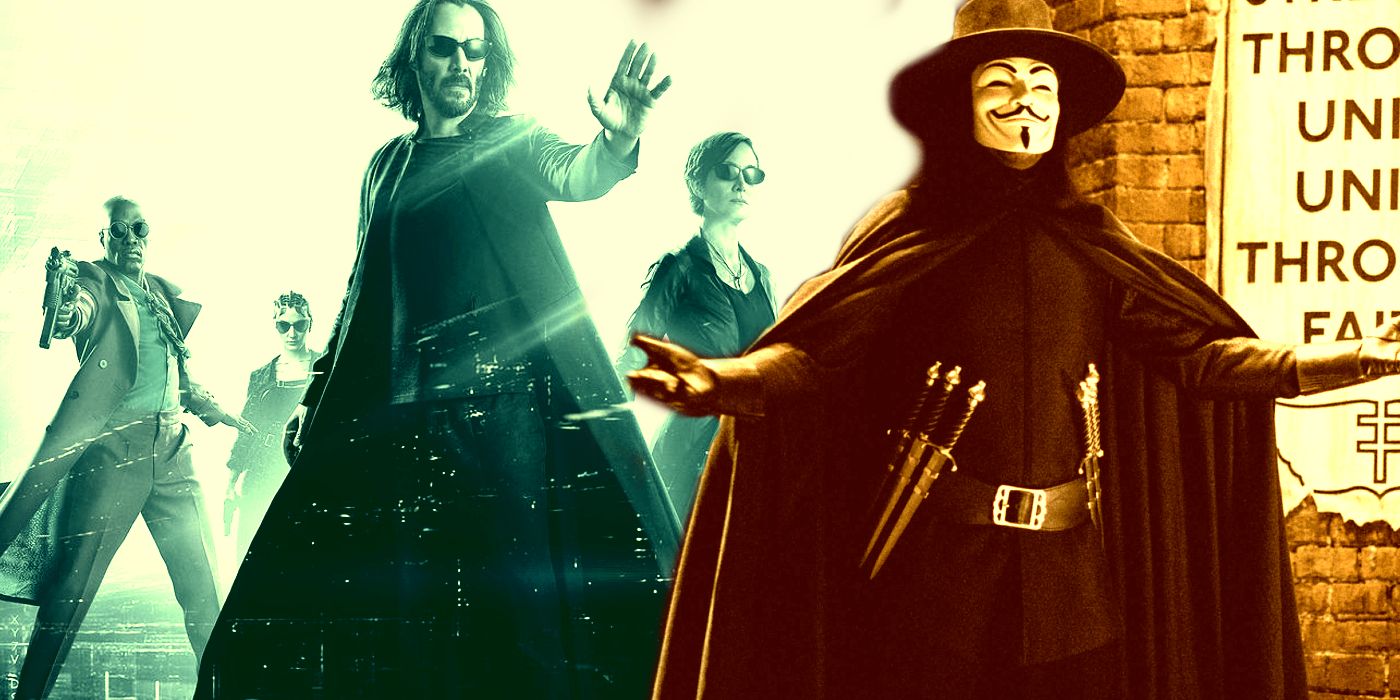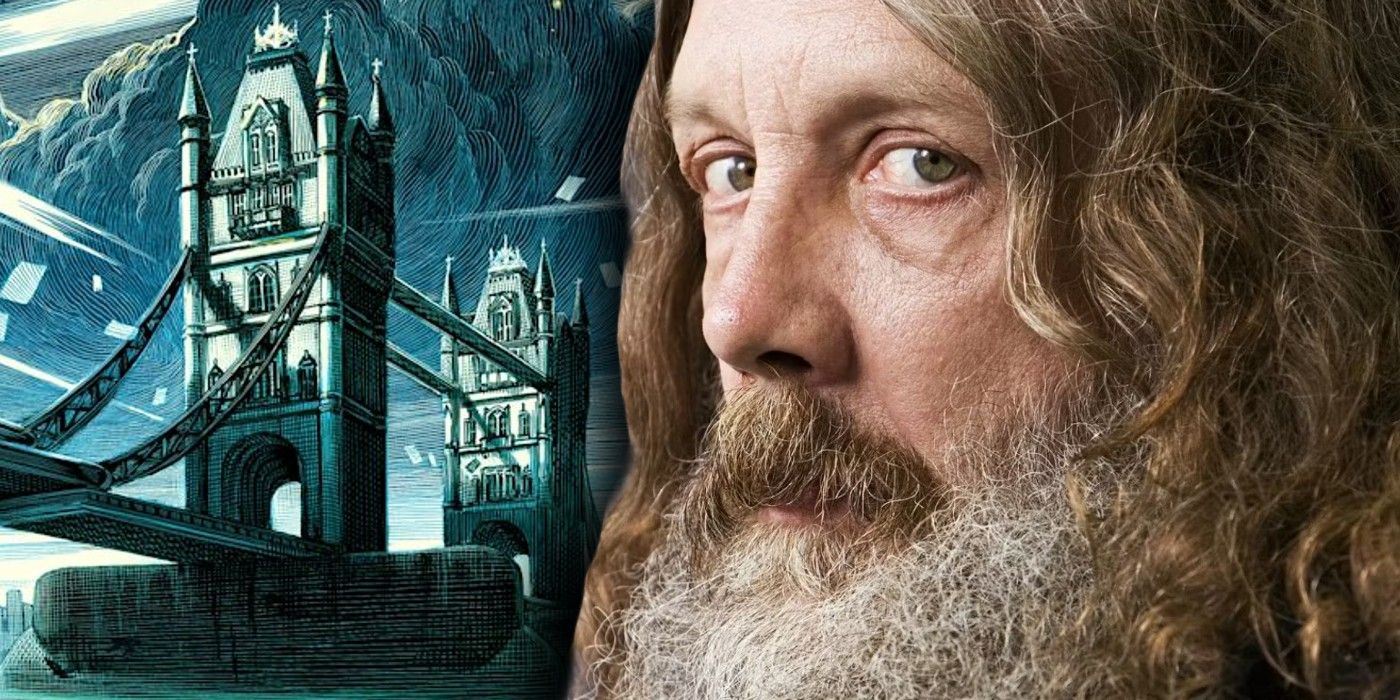A highly anticipated television adaptation of a fantasy novel by Alan Moore is set to captivate audiences. Renowned as a pioneering author, Moore has made a significant impact in the comic book realm with masterpieces like Watchmen, V for Vendetta, Batman: The Killing Joke, From Hell, and Swamp Thing. Despite his history of skepticism towards adaptations of his works?including those of his own creation?Moore has expressed enthusiasm for this latest project, indicating a shift in his perspective. His insights aim to showcase the unique storytelling potential of comic books rather than simply converting them into other formats. This newfound positivity surrounding the adaptation is indeed noteworthy.
Deadline has reported that The Great When, a fresh fantasy novel by Moore, is officially set for a TV adaptation. Playground, a prominent production company, has acquired the adaptation rights for The Great When, which is a graphic novel released by Bloomsbury on October 1. This work marks the beginning of Moore?s ambitious five-volume series, Long London, which Playground intends to transform into a multi-season television series. Moore?s response to this exciting news is reflected in the statement below:
For the first time in my career, I?m genuinely excited and enthusiastic about a work of mine?one that I own, and believe could work marvelously in a different medium?being adapted for the screen.
In Playground, I feel that I?ve connected with people who respect both me and the narrative and are receptive to such input as I can offer. And, given Playground?s track record, I have little doubt that this will be anything short of spectacular. It?s taken me some time, but I think at last I?m ready for my closeup.
David Stern, the Joint Managing Director of Playground, played a crucial role in acquiring the rights and shared his thoughts on the adaptation:
Alan Moore?s The Great When is an extraordinary work of imagination, combining elements of history, fantasy, and mystery to create a world that is both epic and intimate, strange yet deeply human. This project represents the type of storytelling we at Playground are passionate about, and we couldn?t be more thrilled to be working with Alan, one of the most influential writers of our time, to bring this remarkable work to television.
Understanding the Significance of Adapting The Great When
Exploring the Journey of Dennis Knuckleyard, the Young Clerk
The Great When is set in a post-World War II London that follows the intriguing journey of Dennis Knuckleyard, a young clerk working in a second-hand bookshop. During his mundane life, Dennis stumbles upon a peculiar novel that challenges the boundaries of reality. This fictitious literary work, originating from The Great When, unveils a hellish and fantastical realm that serves as a supernatural counterpart to Dennis’ own city. Faced with the dire decision of whether to return the book or risk his life, Dennis embarks on a perilous adventure that could jeopardize both worlds.

Related
10 Essential Works To Read By Alan Moore, Ranked
British comics writer Alan Moore is a household name thanks to the many cinematic adaptions of his comics and graphic novels. Here are his best works.
The adaptation of The Great When signifies a pivotal moment for Playground, a company widely recognized for its dedication to British period dramas. Known for successful projects like Wolf Hall and King Lear, Playground has attracted renowned talents such as Mark Rylance and Anthony Hopkins. While it remains early in the development of The Great When, with further books yet to be penned and talent still to be recruited, the commitment to casting choices will greatly enhance the adaptation?s potential.
Colin Callender?s production company is now poised to expand its focus towards building a potentially lucrative franchise, uniquely positioned by having Moore?s endorsement to proceed. This approval is significant, especially given Moore?s complex history with adaptations of his works, many of which have not concluded positively.
Exploring Alan Moore’s Complex History with Adaptations
Understanding the Past Controversies Surrounding Adaptations
The journey of Alan Moore’s adaptations began with the 2001 film From Hell, which starred Johnny Depp. Directed by the Hughes brothers, the adaptation made substantial changes, including altering the main character from an older detective to a younger protagonist, played by Depp. Following this, 2003?s League of Extraordinary Gentlemen faced similar criticisms for its numerous deviations and a notably altered ending. Moore later described his expectation that no one would mistake the films for the original comics as ?naive.?
Moore?s dissatisfaction with the Extraordinary Gentlemen adaptation was exacerbated by a lawsuit claiming that the film had plagiarized an unproduced script. He openly stated that he had sold the rights purely for financial gain and admitted to never having watched the adaptation of The League of Extraordinary Gentlemen.
Following these dustups and others, Moore requested that his name be removed from adaptations, including Watchmen and V for Vendetta, adding that he would not allow his name to be used in any future adaptations of works he does not own.
However, Moore’s most significant dispute arose with Warner Bros. The studio engaged in a conflict with Moore, who expressed his desire not to partake in the Wachowskis? adaptation of V for Vendetta. In a candid interview with MTV.com, he articulated his criticisms, emphasizing that the source material explicitly addresses themes of fascism and anarchy, concepts that were notably absent from the film adaptation.

Related
Why V For Vendetta Is A Better Matrix Movie Than Resurrections
V for Vendetta is a better spiritual successor to The Matrix trilogy than the fourth Matrix film thanks to its action, philosophy, and lead actor.
In light of these challenges and others, Moore made a formal request to have his name removed from adaptations, including Watchmen and V for Vendetta. He firmly stated that he would not permit his name to be associated with future adaptations of works he does not own, nor would he accept financial compensation from such projects. This context makes his endorsement of The Great When exceedingly significant.
Analyzing Our Perspective on The Great When
Recognizing the Shift in Tone and Attitude
Alan Moore has always been candid about his views on adaptations of his works, often expressing strong criticisms towards the current state of the comic book industry and the superhero film landscape. This perspective is understandable, considering his tumultuous history with DC Comics and the prolonged disagreements that have ensued. Perhaps the most remarkable aspect of the upcoming The Great When adaptation is Moore?s unexpected embrace of the project, marking a significant departure from his previously guarded stance.
Source: Deadline, MTV.com
Alan Moore
Discover the latest news and filmography for Alan Moore, known for V for Vendetta and Watchmen.
- Birthdate
- November 18, 1953
- Birthplace
- Northampton, Northamptonshire, England
- Professions
- Writer , Cartoonist






